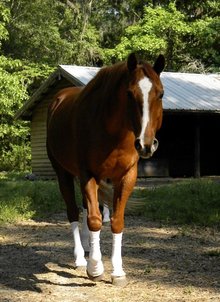Summer Whinnys™ helps veterinarians, trainers and owners save money and protect a horse’s largest organ from disease carrying insects and infection.

Summer Whinneys™ - Protecting horses
Left to its own devices against miseries from airborne allergens to biting insects, a horse's skin can only scale, crust, lump, change color, or ulcerate in its effort to protect itself from further trauma.
© 2013 by Sox for Horses
It’s a maddening conundrum for veterinarians. The skin is the largest organ of a horse’s body, but its responses to dermatological trauma or irritation are astonishingly limited and uncomfortable.
Left to its own natural devices against a spectrum of miseries from airborne allergens to biting insects, skin can only scale/ crust, lump/ bump, change hair quality/quantity, change color, and/or ulcerate in its effort to protect itself from further trauma or infection and encourage healing.
Looking at equine dermatological issues, the University of California-Davis Equine Center stressed the importance of controlling flying insects during the healing process to minimize further trauma or infection: “Use fly masks or other forms of dress that physically obstruct insects from reaching the skin.” (Volume 24, Number 1 of The Horse Report)
Sox For Horses, Inc. president and founder, Raymond Petterson, saw the protective effectiveness of his product in action while visiting the FTI Consulting Winter Equestrian Festival in February and Steve Soule, DVM, of the Palm Beach Equine Medical Center.
“We went all over WEF and Wellington,” said Petterson, listening as his host described the relentless battle he and other showground veterinarians face when treating summer sores and performance boot abrasions.
“Flies and dirt are our worst enemies when trying to heal these issues. If you can get air to the sores and abrasions; and keep the environment around a leg clean, you can make progress," Dr. Soule told Petterson.
Using Summer Whinnys™ as a barrier to protect these leg issues, Dr. Soule added that he had seen “unanimous success” so far in alleviating every problem he had applied the socks to.
Going to Wellington to see firsthand how Summer Whinnys™ performed as a barrier against biting insects and dirt amid a warm, wet, fly-infested environment was huge validation for Petterson.
"I wish I had taken more video interviews, because so many trainers and barn owners let me know how they were successfully utilizing Summer Whinnys™ as tools in their barns to protect healing sores and wounds, and with great results. Without exception, the number one comment was concerning how much money they had saved, in long-term use of bandaging materials.
“I’ve always believed Summer Whinnys™ will be an asset to veterinarians,” said Petterson. “I have an antimicrobial sock that can help veterinarians by protecting difficult leg issues such as summer sores, and performance boot abrasions in an inexpensive manner.
This sock can save the equine owner a lot of money in lieu of expensive bandaging materials that are discarded often. Summer Whinnys™ add the benefit of moisture management while allowing necessary air to reach the skin while protecting against biting insects.”
Using socks meant to last through multiple uses, fly protection has been addressed in a whole new way. It won’t be long before more vets refer Summer Whinnys™ to their clients. Sox For Horses belong in barns for many reasons; as the ultimate in fly protection is just one.
Sox For Horses, Inc. will give veterinarians a free Summer Whinnys™ sample sock upon request. For unique bandaging situations, Sox For Horses will work with veterinarians to tailor socks with special modifications or knitting designs. Learn more by calling Sox For Horses, (850) 907-5724, or email info@whinnywarmers.com
